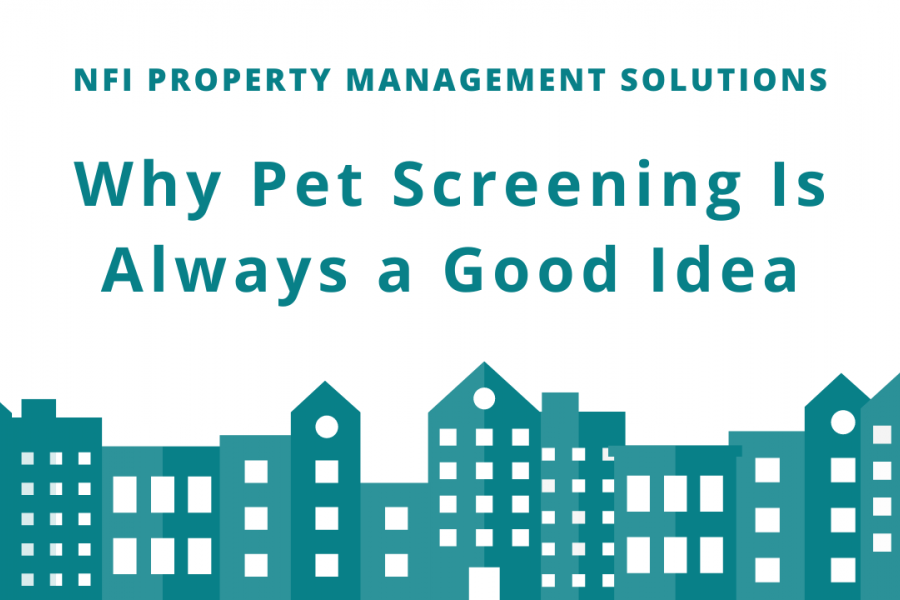
Being a landlord comes with many decisions, including those involving pets. Without proper screening, allowing pets into your rental property can lead to issues such as noise complaints and property damage.
These can significantly impact your bottom line and lead to a poor landlording experience for you!
Pet screening is an essential part of the tenancy process to protect your property and ensure the well-being of all tenants. In this article, we'll discuss why pet screening is always a good idea for landlords.
Why Allowing Pets in Your Rental Property Is Beneficial
Landlords who allow pets into their rental properties enjoy quite a substantial number of benefits over landlords who don’t. You can boost your tenant retention rates, attract tenants who care for your property, and even be able to charge more rent, among others.
With all these benefits, it means you may be able to maximize your income and reach your investment goals faster. The following are some of the benefits of allowing pets into your rental property.
Tenant Retention
Tenants with pets often stay longer in rental units. This is because only a few pet-friendly rentals are available on the market. And once a tenant has found one, they are likely to stay longer.

It also improves tenant retention rates and reduces turnover costs. As a result, landlords save time, money, and effort; the perfect recipe for a high ROI.
Enhances Property Value
Accepting pets can attract responsible tenants who care for their homes. This improves the property's condition and value over time.
You see, caring for a pet is no easy job. It goes beyond just providing food and shelter. Responsible pet owners know that caring for their pets is a lifetime commitment that involves caring for their physical and emotional well-being.
Pet owners have to feed their furry friends, provide them with a comfortable space, schedule vet checkups, train and socialize them, and more. And if they can do all of that, it may also translate into being responsible with their rental space.
Raises Demand for Rental Units
Permitting pets broadens the pool of potential tenants. Higher demand allows landlords to charge higher rent and enhances the property's market value.
What Is Pet Screening?
Pet screening evaluates an animal's behavior and compatibility with living in a rental home. This helps in determining suitability for apartment living, inter-pet harmony, child interactions, and obedience response.
Pet screenings also consider medical or behavioral issues that may impact the pet's environment.
Advantages of Screening Pets
Pet screening safeguards the well-being of both pets and tenants. This prevents the entry of potentially aggressive animals into homes, protecting everyone from harm.

Evaluating pets ensures owners are aware of their responsibilities. Including house training, vaccinations, and cleaning habits.
Pet screening also offers insight into an animal's previous behavioral issues. The last thing you want is to allow an aggressive pet into your rental property. It may not only be a safety risk to other tenants, but also cause potential damage to your property.
What Does Screening a Pet Involve?
Interview the Prospective Pet Owner
To guarantee the well-being of all pets and tenants, you must develop a thorough pet screening process. This will offer you useful details about the pet you’re potentially looking to allow into your rental property.
The following is the information you may want to know from the pet owner for easier decision-making.
- Name and classification of the pet
- Breed, age, and gender of the pet
- Recent vaccination records
- Recognized behavioral or health problems
- History of harming people or animals
- House training status
- Any relevant additional information the tenant may want to provide you with
Admittedly, dogs and cats are some of the most common pets you’ll encounter as a pet-friendly landlord. The following are the specific questions you can pose to the dog or cat owner to understand their pet’s behavioral or health status.
Dogs:
- Have you spayed or neutered your dog?

- Has the dog completed any training exercises in the past? If so, what kind?
- Do you leash your dog during walks?
- Do you immediately clean up after your dog?
- How much time do you leave your dog alone in the house?
Cats:
- What is the spaying status of your cat?
- Does your cat stay indoors or outdoors?
- Does your cat use a litter box?
- Have you registered your cat?
Face-to-Face Meeting
After receiving the pet application, it's crucial to schedule an in-person meeting with the potential tenant and their pet. This encounter permits you to assess the pet's behavior and ask further inquiries regarding the application.
Please note, however, that this meeting may not give you the perfect insight into the pet’s behavior. This is because the pet may be nervous around new people.
Conclusion
Allowing pets into your rental property has multiple benefits as already mentioned. However, for that to happen, you must first ensure you allow the right pets into your property. You want to rent to a responsible pet owner, as well as ensure their pet meets certain key criteria.
For expert help in screening pets or the overall management of your rental property, look no further than NFI Property Management Solutions. Our full-service property management service includes property marketing, tenant screening, rent collection, evictions, and inspection and maintenance.
Get in touch today to get started!